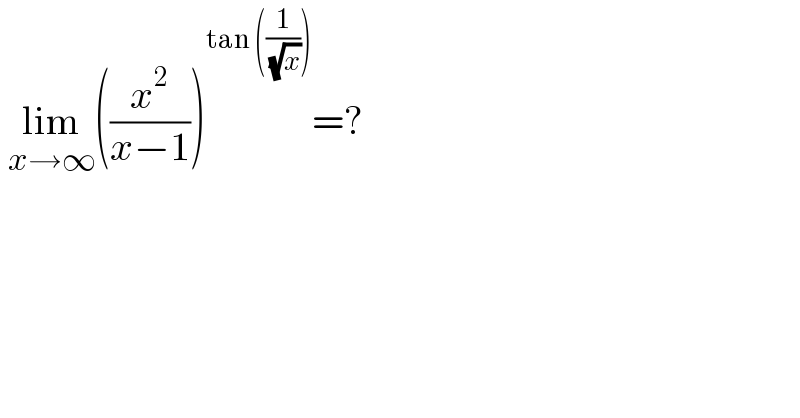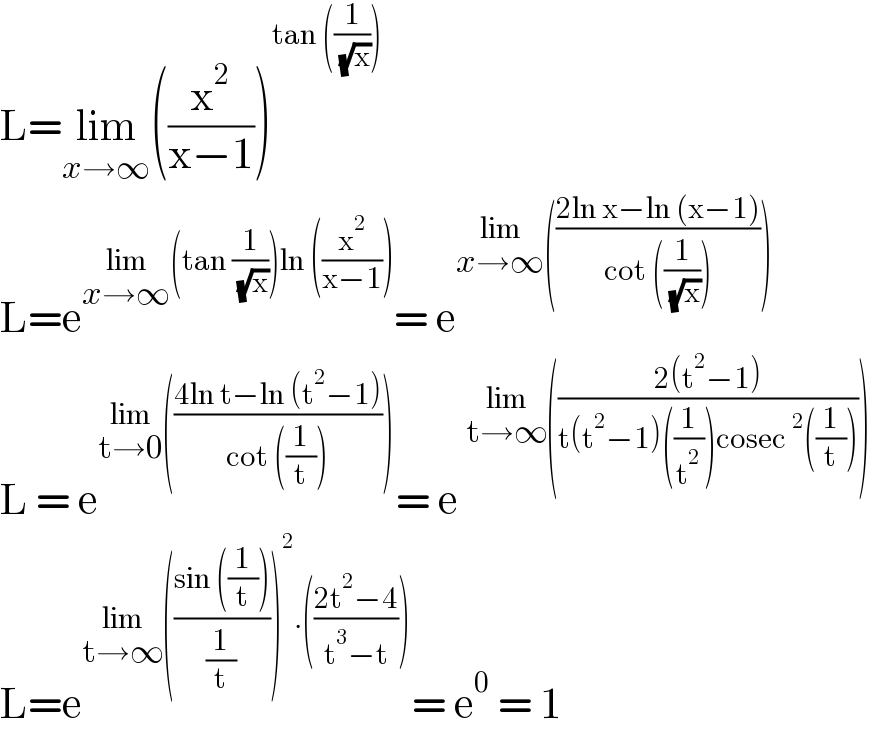Question Number 131383 by EDWIN88 last updated on 04/Feb/21

$$\:\underset{{x}\rightarrow\infty} {\mathrm{lim}}\left(\frac{{x}^{\mathrm{2}} }{{x}−\mathrm{1}}\right)^{\mathrm{tan}\:\left(\frac{\mathrm{1}}{\:\sqrt{{x}}}\right)} =? \\ $$
Answered by liberty last updated on 04/Feb/21

$$\mathrm{L}=\underset{{x}\rightarrow\infty} {\mathrm{lim}}\left(\frac{\mathrm{x}^{\mathrm{2}} }{\mathrm{x}−\mathrm{1}}\right)^{\mathrm{tan}\:\left(\frac{\mathrm{1}}{\:\sqrt{\mathrm{x}}}\right)} \\ $$$$\mathrm{L}=\mathrm{e}^{\underset{{x}\rightarrow\infty} {\mathrm{lim}}\left(\mathrm{tan}\:\frac{\mathrm{1}}{\:\sqrt{\mathrm{x}}}\right)\mathrm{ln}\:\left(\frac{\mathrm{x}^{\mathrm{2}} }{\mathrm{x}−\mathrm{1}}\right)} =\:\mathrm{e}^{\underset{{x}\rightarrow\infty} {\mathrm{lim}}\left(\frac{\mathrm{2ln}\:\mathrm{x}−\mathrm{ln}\:\left(\mathrm{x}−\mathrm{1}\right)}{\mathrm{cot}\:\left(\frac{\mathrm{1}}{\:\sqrt{\mathrm{x}}}\right)}\right)} \\ $$$$\mathrm{L}\:=\:\mathrm{e}^{\underset{\mathrm{t}\rightarrow\mathrm{0}} {\mathrm{lim}}\left(\frac{\mathrm{4ln}\:\mathrm{t}−\mathrm{ln}\:\left(\mathrm{t}^{\mathrm{2}} −\mathrm{1}\right)}{\mathrm{cot}\:\left(\frac{\mathrm{1}}{\mathrm{t}}\right)}\right)} =\:\mathrm{e}\:^{\underset{\mathrm{t}\rightarrow\infty} {\mathrm{lim}}\left(\frac{\mathrm{2}\left(\mathrm{t}^{\mathrm{2}} −\mathrm{1}\right)}{\mathrm{t}\left(\mathrm{t}^{\mathrm{2}} −\mathrm{1}\right)\left(\frac{\mathrm{1}}{\mathrm{t}^{\mathrm{2}} }\right)\mathrm{cosec}\:^{\mathrm{2}} \left(\frac{\mathrm{1}}{\mathrm{t}}\right)}\right)} \\ $$$$\mathrm{L}=\mathrm{e}^{\underset{\mathrm{t}\rightarrow\infty} {\mathrm{lim}}\left(\frac{\mathrm{sin}\:\left(\frac{\mathrm{1}}{\mathrm{t}}\right)}{\frac{\mathrm{1}}{\mathrm{t}}}\right)^{\mathrm{2}} .\left(\frac{\mathrm{2t}^{\mathrm{2}} −\mathrm{4}}{\mathrm{t}^{\mathrm{3}} −\mathrm{t}}\right)} =\:\mathrm{e}^{\mathrm{0}} \:=\:\mathrm{1} \\ $$
